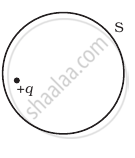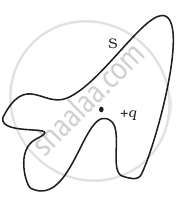Advertisements
Advertisements
Question
If the total charge enclosed by a surface is zero, does it imply that the elecric field everywhere on the surface is zero? Conversely, if the electric field everywhere on a surface is zero, does it imply that net charge inside is zero.
Solution
According to Gauss’ law, the flux associated with any closed surface is given by
In the left side equation, the electric field is due to all the charges present both inside as well as outside the Gaussian surface.
Thus, despite being total charge enclosed by a surface zero, it doesn’t imply that the electric field everywhere on the surface is zero, the field may be normal to the surface.
Also, conversely if the electric field everywhere on a surface is zero.
APPEARS IN
RELATED QUESTIONS
A charge Q is placed at the centre of a cube. Find the flux of the electric field through the six surfaces of the cube.
State Gauss's law in electrostatics. Show, with the help of a suitable example along with the figure, that the outward flux due to a point charge 'q'. in vacuum within a closed surface, is independent of its size or shape and is given by
Answer the following question.
State Gauss's law on electrostatics and drive expression for the electric field due to a long straight thin uniformly charged wire (linear charge density λ) at a point lying at a distance r from the wire.
Gaussian surface cannot pass through discrete charge because ____________.
The Gaussian surface ______.
The surface considered for Gauss’s law is called ______.
Which of the following statements is not true about Gauss’s law?
The Electric flux through the surface
 (i) |
 (ii) |
 (iii) |
 (iv) |
